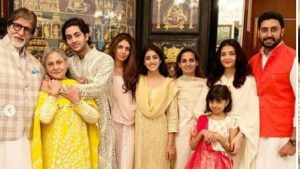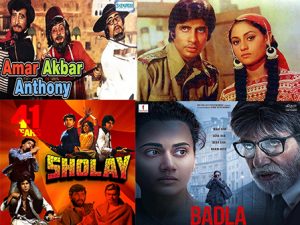Big B turns 77: An account of his iconic journey through the years
Big B is not a name but a legacy! Big B is not just fame but humanness! And Indian cinema is blessed to have a gem like him.

Amitabh Bachchan (born Inquilaab Srivastava) is a name that is synonymous with the pride of Indian cinema and the country as a whole. Born to poet Harivansh Rai Bachchan and social activist Teji Bachchan in Allahabad, he always had a keen interest in theatre and films, which made him want to pursue his acting dreams.
Around the late 1960s, a boy in his mid-20s was struggling in Mumbai to take a step towards Bollywood. He faced multiple rejections and was almost on the verge of giving up his dreams unbeknownst of the fact that he would grow up to be one of the biggest stars in the history of Indian as well as world cinema. After working in a successful career spanning five decades on nearly 200 Indian films, Amitabh Bachchan or Big B (as fondly called by admirers) continues to be the ‘Shahenshah of Bollywood’ and the ruler of millions of hearts all across the globe.
He is the recipient of the highest number of National Filmfare Awards for Best Actor. He has also been awarded Padma Shri, Padma Bhushan and Padma Vibushan in 1984, 2001 and 2015, respectively. He has been honoured by the Legion of Honour, France and recently received the Dadasaheb Phalke Award by the Government of India.
As the legendary actor and incredible personality turn 77, we take a look at the journey that made him live up to his name, meaning ‘the sun’ or ‘boundless splendour’.
Bachchan’s first stint in Hindi Cinema arrived with Khwaja Ahmad Abbas’ Saat Hindustani in 1969. Although featured as one of the protagonists’ alongside an ensemble cast, his performance as the Muslim poet Anwar Ali was commendable. He also lent his voice to Mrinal Sen’s Bhuvan Shome in the same year, which officially marked his debut in the Hindi film industry. However, this was followed by a string of unsuccessful releases. Most of his roles in the following years were either uncredited or a special cameo. His only notable work amidst the period he was struggling to make a name for himself in the world of cinema was Anand directed by Hrishikesh Mukherjee in 1971. He played Dr Bhaskar Banerjee alongside the then superstar Rajesh Khanna. His naturalistic portrayal of the character in the film brought him his first Filmfare Award as a Supporting Actor.
Also Read : Remembering The Mahanayak Uttam Kumar On His 93rd Birth Anniversary
Amitabh Bachchan’s first film as a lead was Bombay to Goa which did moderately well in cinemas.
It was this film that paved the way for Bachchan’s forthcoming years of superstardom. His biggest breakthrough performance came with Prakash Mehra’s 1973 film Zanjeer, where he played the role of honest and righteous Inspector Vijay Khanna. It was with this role that he established a stronghold on action films and came to be known as ‘The Angry Young Man’ of Indian Cinema. Later in his career, he repeatedly showcased his talents beyond the given title but the image certainly made him stand out amidst his contemporaries. The musical drama Abhimaan was released in the same year and saw Bachchan in a completely different role. He successfully became one of the earliest contributors of justifying grey shades in a lead character and proved that he is here is to stay. Namak Haraam, also released in the same year and was well received by audiences. He received the Filmfare Award for Best Supporting Actor once again for his multi-layered performance as Vikram Maharaj or Vicky.
The era of Amitabh Bachchan’s rise to stardom thus began with some blockbuster hits in the next few years. Among his exceptional works, the 1975 films Deewaar and Sholay deserve special mentions. In Deewaar, he won countless hearts by effortlessly breathing life to the image of an anti-hero and evoking a successful cathartic connection with the audience. On the contrary, in Sholay, he plays the iconic character of cynical yet kind-hearted Jai. As both the characters meet their respective tragic endings, the actor wins over his viewers a little more with the brilliance in his work. Both the films as well as the characters are considered as classics in the history of Indian cinema and are remembered to the day. In addition, more releases like Mili and Chupke Chupke in the same year, especially with his foray into romantic, emotional and comic characters like Shekhar Dayal and Parimal Tripathi, respectively, rightly proclaimed him as the superstar of the 1970s and 1980s.
Yash Chopra’s 1976 film Kabhie Kabhie saw Bachchan in a completely different light. With the character of a poet and lover Amitabh Malhotra, he also showcased his skills in the romantic genre. The film and his acting were praised by critics and viewers alike. His first Filmfare Award for Best Actor came around the following year with another iconic role of liquor dealer Anthony Gonsalves in Manmohan Desai’s Amar Akbar Anthony. Bachchan makes the viewers fall for the character despite his questionable traits. The role earned him immense critical appreciation.
The year 1978 is still helmed as Bachchan’s year. With six consecutive releases like Muqaddar ka Sikander, Don, Trishul, Kasme Vaade, Ganga Ki Saugandh and Besharam, his career was thriving.
All of these films were commercially and critically hit and took the box-office by storm. Most of these works were also among the highest-grossing films of the said year, a scenario which was rare for a single actor to achieve.

In 1979, he played the criminal Amit in Suhaagwho transitions into a positive character through the course of the film. The film was another highest grosser of the year. A major array of successful films like The Great Gambler, Manzil, Mr Natwarlal, Kaala Patthar, Dostana, Yaarana, Shaan, Lawaris, Naseeb, Kaalia, Ram Balraam, Barsaat Ki Ek Raat, Satte Pe Satta, Namak Halaal, Khud-Daar followed suit. He also took the art of playing double roles to newer heights through films like Don, Kasme Vaade, Adalat among others. Two of his noteworthy critically acclaimed performances in the same era include Silsila and Bemisaal. Both of his characters in these were loved by audiences and critics alike.
It was rightly established through all of these films that there was not a single genre that Amitabh Bachchan failed to ace. Action, Drama, Tragedy, Comedy, Romantic, Emotional, he experimented through all such characterizations and emerged victorious in every category.
Unfortunately, at the peak of his successful career, he came face-to-face with the biggest hurdle of his life. The fatal injury on the sets of Coolie in 1982 left him battling with life for months. Much like the roles he has essayed, he faced a tragedy but like an ultimate hero fought through his struggles and came out victorious.
After a long healing process, he stepped into politics for a while and marked his comeback with Shahenshah in 1988. The film was undoubtedly a hit. Other releases like Mard and Akhree Raasta which were shot earlier as well as Coolie itself were massive hits. Although the newly starred films mostly suffered from a setback, the crime drama Hum got him his second Filmfare Award for Best Actor after Don.
Bachchan stepped into the 90s with Agneepath, which is now considered as a cult film and received his much deserving first-ever National Film Award for Best Actor for his iconic portrayal of Vijay Deenanath Chavan. After another critically acclaimed project, the grand Khuda-Gawah, he took a temporary hiatus from films.
He made his major comeback with the 1988 films Major Saab and Bade Miyan Chote Miyan, both of which achieved commercial success. The 1999 double role drama Sooryavansham was also well-received. The second phase of his acting career and his rise to prominence once again began with Aditya Chopra’s Mohabbatein. The portrayal of authoritative, stern and rigid director of Gurukul, Narayan Shankar, not only earned him his third Filmfare Award for Best Supporting Actor but also immense critical and commercial acclaim. He moved towards senior roles and earned great appreciation for films like Ek Rishtaa, Kabhi Khushi Kabhi Gham, Baghban, Sarkar and Kabhi Alvida Naa Kehna among various others. His role of the possessed police inspector in Aks got him his first Filmfare Critics Award for Best Actor.
Also Read : Lust Stories Establishes Future Of Streaming In India
Perhaps the biggest venture post his return to films was Sanjay Leela Bhansali’s Black in 2005 that garnered high appreciation from all across the globe. Bachchan was phenomenal in his role of an ageing teacher of the autistic Michelle. He got his second National Film Award for Best Actor, his fourth Filmfare for Best Actor and second Filmfare Critics Choice for Best Actor for his role. Later films like Baabul and Nishabd did not receive commercial success but Amitabh Bachchan’s performances were once again highly praised.
His most recent set of iconic works that would again be remembered in the history of Indian Cinema include Paa, where he plays the Progeric 13-year-old Auro, the old Bhashkor Banerjee in Piku and the retired lawyer in Pink. The former gave him the third National Film Award for Best Actor and fifth Filmfare for Best Actor while the latter brought him his fourth National Award.
He also appeared in Rituparno Ghosh’s English Language film The Last Lear and made his Hollywood debut with The Great Gatsby. His show Kaun Banega Crorepatiis also one of the topmost realities shows in Indian television.
Last year, he appeared in films like 102 Not Out and Thugs of Hindostan, and this year, he once again performed exceptionally well in Badla. His major upcoming releases include Brahmastra and Gulabo Sitabo.
After all the years of experiences and expertise, Amitabh Bachchan continues to be the ‘Star of the Millennium’ or ‘The Greatest Star of the Century’. He continues to inspire millions across the generations and remains the uncrowned king of Indian cinema.
